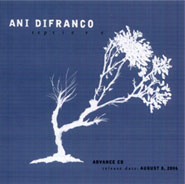Ani DiFranco
Reprieve
(Righteous Babe)
Right
from the start, at the dawn of a career that still didn't bear that name,
the guitar has always been the counterpart for Ani DiFranco's voice; at
first bearing traces of a home-made "folk with punk accents" approach,
her guitar style later opened up to funky, jazz and African-percussive
echoes (and to electricity), always one of a piece with her compositional
and vocal style, as is the norm in such cases (readers will have fun recalling
their favourite instrumental examples). We can also consider how easily
and how naturally an instrumental approach that had been developed in solitude
later became an integral part of a large group which included wind instruments.
Last
year, while sorry for the news about Ani DiFranco suffering from Carpal Tunnel
Syndrome, I questioned myself about the possible consequences of
this fact on her music. The composite Evolve (2003) had seen her guitars
going deeply into the vivacious - sometimes frenetic - moods of her old
group for the last time; the solo (though overdubbed) Educated Guess (2004)
appeared as if she was going back to old climates, and in a way the same
could be told of Trust, the DVD-V she recorded live while doing a duo tour
with double bass player Todd Sickafoose; a studio recording where she had
used a group and a producer, Knuckle Down (2005) appeared as giving "cow-punk" and "alt.
country"
shadings to the musician's many musical moods. What about now?
The
decisive element in making Reprieve the very nice album it is is without
a doubt Todd Sickafoose, who also plays the electric Wurlitzer piano and
the pump organ. Of course, the double bass is not a novel instrument in Ani
DiFranco's music, where many times Jason Mercer had used the acoustic instrument
instead of its 5-string electric counterpart. What is obviously new is
the prominence the instrument is given by its being placed in a duo dimension,
more or less, strings and keyboards having echoes, effects, percussion
and loops as their backdrop - and sometimes as their co-protagonists; all
these are elements which give the work a pleasantly
"modern" air, a fact which (maybe) will make it easier for a wider
audience to like this record.
It's
interesting to notice how the reduced emphasis placed on the guitars -
and a certain "widening" of the atmospheres (which doesn't entail
their being more "relaxed"!) - have in a way changed Ani DiFranco's
vocal approach. Todd Sickafoose produces an instrumental timbre that -
just to give readers a flavour of what it sounds like - we could define
as being similar to Charlie Haden's. Nice echoes and proportions, this
is the right place to laude the recording and mix work by Mike Napolitano,
who skillfully complements DiFranco's production. An album that's in a
way quite simple - and one that will be liked starting from the very first
listening session - Reprieve offers quite a few instrumental touches and
shadings that will only appear with repeated listening.
Hypnotized
is an excellent opening track, with a nice double bass in an astute melodic
and harmonic relationship with the piano; there's also a wide spatial placement
when it comes to the voice, where a melody backed by loops and noises opens
up to memory, and a tale. Nice agile pace in the following track, Subconscious,
with its "walkin'" double bass; we also have a nice electric
piano intro - almost "minimalistic"-sounding - in In The Margins.
A double bass as a percussion instrument and a "liquid" synthesizer
are featured in Nicotine, a track that due to its slow pace could have
been titled Opium; nice bass close by Sickafoose. More similar to her already-known
style are Decree and 78% H2O, the latter with its swinging drums played
by Ani DiFranco herself. Wurlitzer and synth integrate the nervous narrative
of Millennium Theater, with its filtered voices: a track that sounds like
a strange version of a "country & western" piece. A wha-wha
guitar (or is it a plug-in?) is featured in Half-Assed, while the title-track
is a spoken-word piece with acoustic guitar and a grieving double bass,
played with the arco. After the very tense A Spade, we are back to the
ballads with Unrequited, with its vocal interpretation so rich with feeling;
and the closing Shroud, where a very "natural-sounding" voice
is a good match for the almost "didactic" tone of the lyrics.
Beppe Colli
© Beppe Colli 2006
CloudsandClocks.net | Aug. 8, 2006











